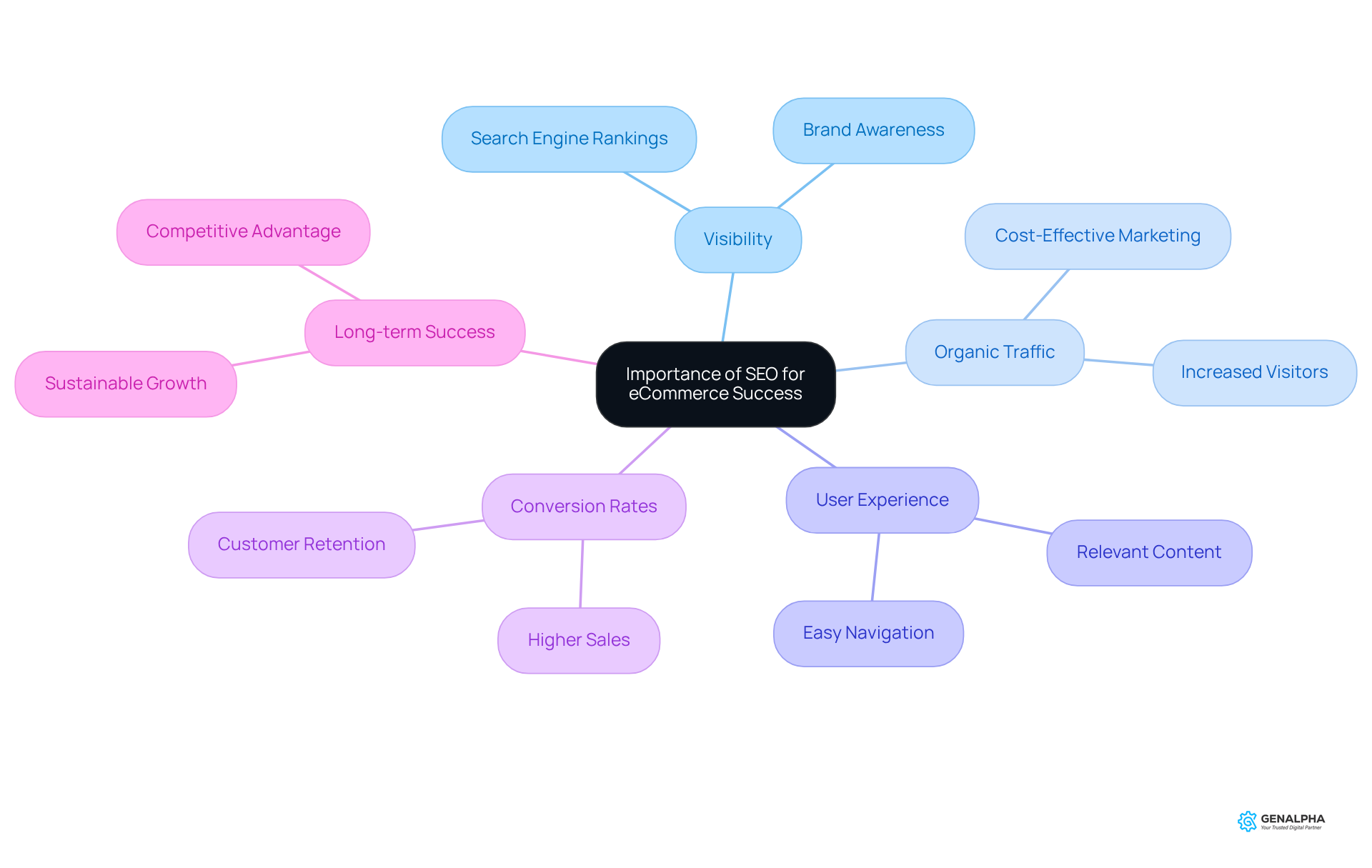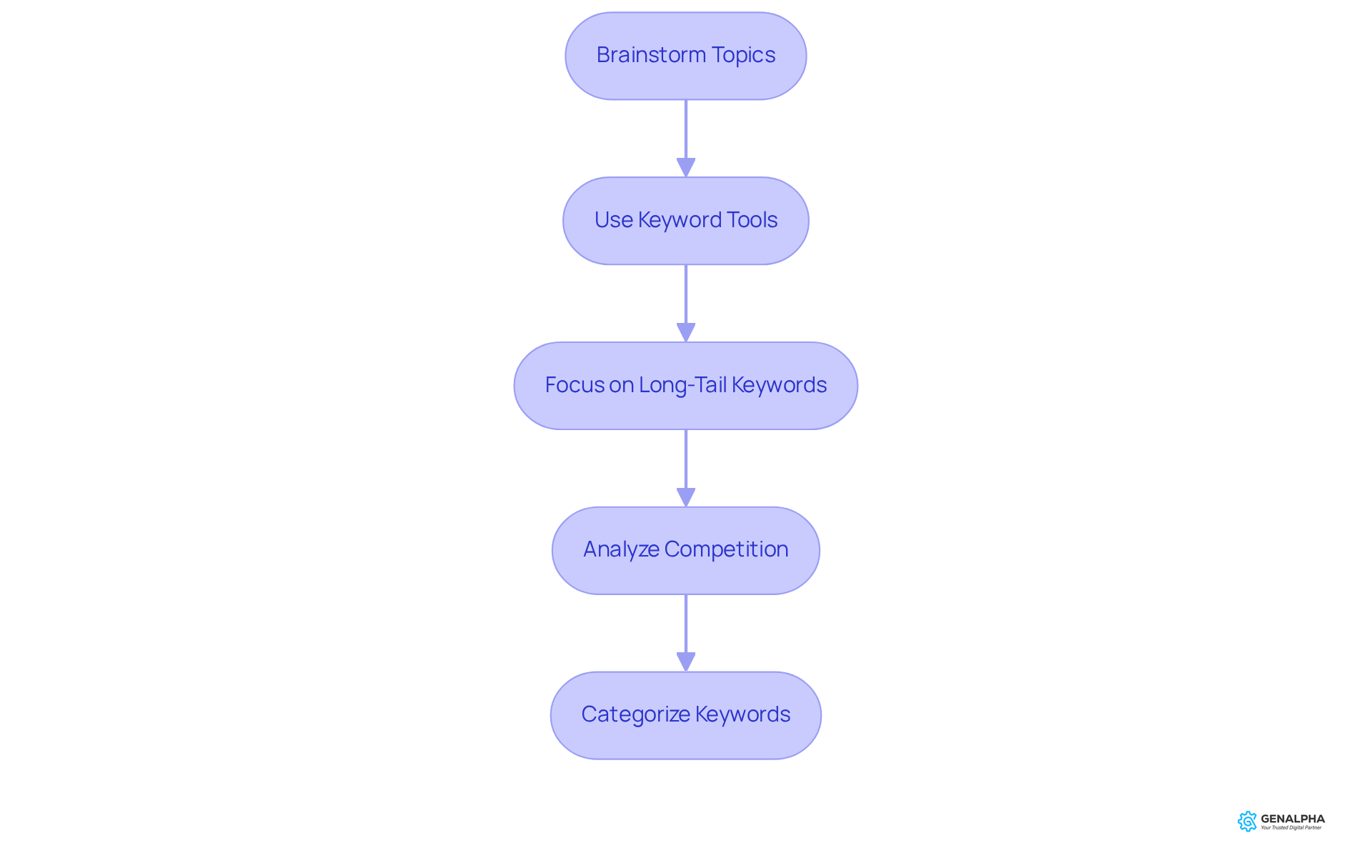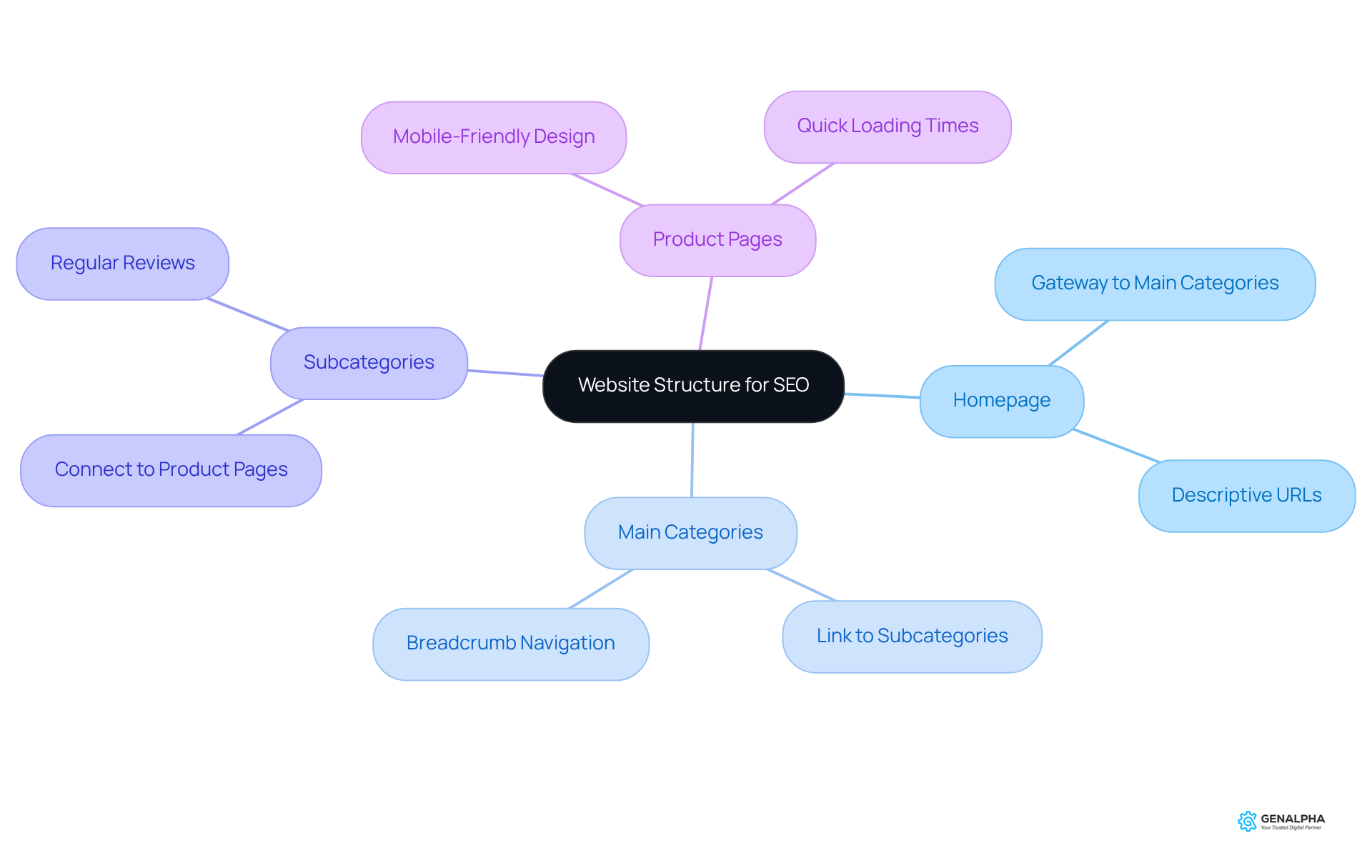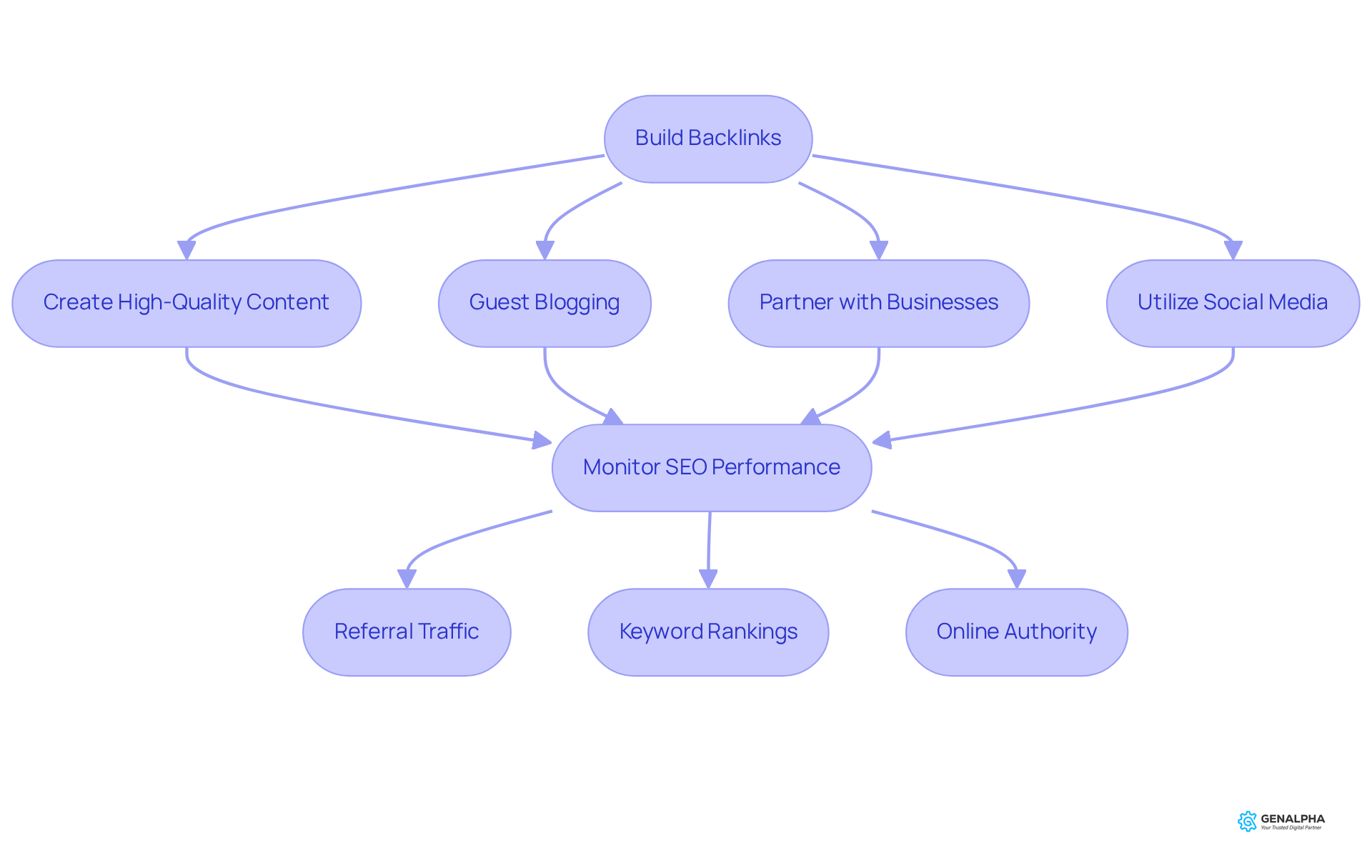Overview
Looking to boost your eCommerce website's visibility? You've come to the right place! This article highlights five essential steps to optimize your site for SEO success. We all know how crucial it is to stand out in the crowded online marketplace, right? So, let’s dive into some friendly tips that can make a big difference.
- Conducting thorough keyword research. Think of it as your treasure map—finding the right keywords can lead potential customers straight to your site!
- Enhancing your website structure. A well-organized site not only helps search engines but also makes it easier for your visitors to find what they need.
- Optimizing on-page elements! This includes everything from meta tags to image alt texts. These little tweaks can significantly improve your search engine rankings.
- Building backlinks. It’s like getting a vote of confidence from other websites, which can really boost your credibility and visibility.
- Following these steps will not only improve your search engine rankings but also increase sales.
So, what are you waiting for? Let’s get started on optimizing your eCommerce website today!
Introduction
In today's fiercely competitive digital marketplace, eCommerce businesses face the challenge of standing out more than ever. Have you ever wondered how mastering Search Engine Optimization (SEO) could be the game-changer that elevates your visibility and drives sales? This article dives into five essential steps to optimize your eCommerce website for success. We’ll explore strategies that not only boost your search rankings but also enhance the user experience. With so many facets to consider, how can you ensure that you’re implementing the most effective SEO practices to capture your target audience's attention?
Understand the Importance of SEO for eCommerce Success
SEO, or Search Engine Optimization, is super important for the success of your seo ecommerce website. Why? Because it directly impacts how visible your site is on search engines. Think about it—when potential customers are on the hunt for products, effective SEO ensures your platform pops up right where they can see it. This boost in visibility can lead to more organic traffic, which often means more sales in your pocket.
But that’s not all! A well-optimized site also makes for a better user experience. It helps customers easily find what they’re looking for, which can improve those all-important conversion rates. In today’s competitive digital world, ignoring SEO is like leaving money on the table. You risk missing out on opportunities and losing your foothold in the market.
So, if you’re aiming for long-term success in your eCommerce venture, understanding and implementing isn’t just a nice-to-have—it’s a must! Have you thought about how SEO could change the game for your business?

Conduct Comprehensive Keyword Research
To kick off your keyword research, why not start with a little brainstorming? Think about the topics that relate to your products. You can use handy tools like Google Keyword Planner, SEMrush, or Ahrefs to expand your list by uncovering popular terms and their search volumes. Have you considered focusing on long-tail keywords? These are those more specific phrases that often show a higher intent to purchase. For instance, instead of just saying 'shoes', try 'men's running shoes size 10'.
Next, take a look at the competition for these keywords. This can help you spot opportunities where you can rank higher. Finally, it’s a good idea to categorize your keywords into primary and secondary groups. This way, you’ll have a clear guide for your content strategy. By following this structured approach, you can ensure your align perfectly with what your customers are actively searching for. So, what do you think? Ready to dive into your keyword research?

Optimize Your Website Structure for SEO
To effectively optimize your website structure for SEO, let’s start with a clear and logical hierarchy. Think of your homepage as the gateway; it should link to your main category pages, which then connect to subcategories and individual product pages. And hey, don’t forget to use descriptive URLs that include relevant keywords, like www.yoursite.com/mens-running-shoes—this really helps boost your search visibility! Plus, implementing breadcrumb navigation is a smart move; it not only helps users understand where they are on your site but also enhances internal linking and user experience. As Ruth Everett puts it, "It's important to look beyond rankings and rather ensure a website is usable for everyone."
Now, considering that a huge chunk of eCommerce traffic comes from mobile devices, making your platform mobile-friendly is a must. This means adopting a responsive design and ensuring quick loading times—both are crucial for keeping users engaged and maintaining your rankings. Regularly reviewing your site structure is key; make sure to detect and fix any broken links or orphaned pages so that all your information stays easily accessible for both users and search engines. Remember, SEO is all about , not just traffic. By focusing on these strategies, you can significantly boost your website's SEO performance, leading to better visibility and, ultimately, increased sales. So, what are you waiting for? Let’s get started on optimizing your site!

Enhance On-Page SEO Elements
Let’s talk about enhancing the on-page elements of your SEO ecommerce website! First things first: optimizing your title tags and meta descriptions for each page is a must for an SEO ecommerce website. Make sure your primary keyword is right there in the title tag—ideally at the beginning—and keep it under 60 characters. Now, when it comes to meta descriptions, craft them to be engaging and informative, featuring a call to action, all while keeping them under 160 characters.
Also, don’t forget about header tags (H1, H2, H3)! They help organize your material logically, with the H1 tag being reserved for your main title. As you write, incorporate relevant keywords naturally throughout your content for your SEO ecommerce website, including in product descriptions, image alt texts, and URLs.
Additionally, ensure your pages load quickly and are mobile-responsive. These factors are crucial for a great user experience and can really boost your SEO rankings. So, are you ready to get started on these optimizations?
Build Backlinks and Monitor SEO Performance
To effectively build backlinks, let’s focus on creating high-quality, shareable content that truly delivers value to your audience. Have you ever thought about guest blogging? It’s a powerful strategy for gaining exposure and securing valuable backlinks on reputable industry sites. In fact, guest blogging can lead to a significant boost in referral traffic and can really help improve your search engine rankings through those high-quality backlinks.
Additionally, partnering with complementary businesses can expand your reach even further through cross-promotion of materials and shared links. And don’t forget about social media! Utilizing these platforms can and motivate others to link back to your webpage.
Once your backlinks are in place, it’s crucial to keep an eye on their performance. Tools like Google Analytics and Ahrefs are perfect for this. You’ll want to monitor important metrics such as:
- Referral traffic
- Keyword rankings
- Your overall online authority
Regularly evaluating your backlink profile ensures your SEO ecommerce website is acquiring high-quality links while also identifying and disavowing any potentially harmful links that could impact your SEO efforts.
This proactive approach not only strengthens your SEO ecommerce website's authority but also drives significant traffic, ultimately enhancing your online presence. As Daniel Hamilton, Director of SEO, wisely states, "Building authority in your industry goes hand in hand with building trust." So, what steps will you take today to start building those valuable backlinks?

Conclusion
Optimizing your eCommerce website for SEO isn’t just a nice-to-have; it’s a must if you want to thrive in today’s competitive online marketplace. By boosting your visibility on search engines, you can drive more organic traffic, which leads to higher conversion rates and, ultimately, more sales. Think about it: ignoring SEO strategies could mean missing out on valuable opportunities and losing your edge in the market.
So, what are the key steps to get your eCommerce site optimized? Start with:
- Thorough keyword research
- Structure your site for peak SEO performance
- Enhance your on-page elements
- Build quality backlinks
Each of these components is crucial for improving your search engine rankings and user experience. From utilizing long-tail keywords to crafting engaging title tags and meta descriptions, every little detail counts toward creating a stronger online presence. Plus, keeping an eye on your SEO performance will help you stay in tune with evolving market trends and user behavior.
The importance of solid SEO practices can’t be overstated. As the digital landscape keeps changing, taking proactive steps to optimize your eCommerce website will not only boost your visibility but also build trust and authority in your industry. So, why not embrace these strategies? Leverage the tools and insights available to stay ahead of the competition and unlock your online potential. Investing in SEO today is your ticket to lasting success tomorrow.
Frequently Asked Questions
Why is SEO important for eCommerce success?
SEO is crucial for eCommerce success because it enhances the visibility of your website on search engines, leading to increased organic traffic and potential sales. A well-optimized site also improves user experience, helping customers find what they need more easily, which can boost conversion rates.
What are the consequences of neglecting SEO in eCommerce?
Ignoring SEO can result in missed opportunities and a loss of market presence. It can hinder your site's visibility, causing potential customers to overlook your offerings, which ultimately affects sales and long-term success.
How can I start conducting keyword research for my eCommerce site?
Begin by brainstorming topics related to your products. Use tools like Google Keyword Planner, SEMrush, or Ahrefs to identify popular search terms and their volumes. Consider focusing on long-tail keywords for higher purchase intent and analyze the competition for these keywords to find ranking opportunities.
What are long-tail keywords, and why are they beneficial?
Long-tail keywords are specific phrases that typically have lower search volume but higher intent to purchase. For example, instead of just using "shoes," you might use "men's running shoes size 10." They can help you attract more targeted traffic and improve conversion rates.
How should I categorize my keywords during research?
It's advisable to categorize your keywords into primary and secondary groups. This structured approach provides a clear guide for your content strategy, ensuring that your SEO efforts align with what customers are actively searching for.




